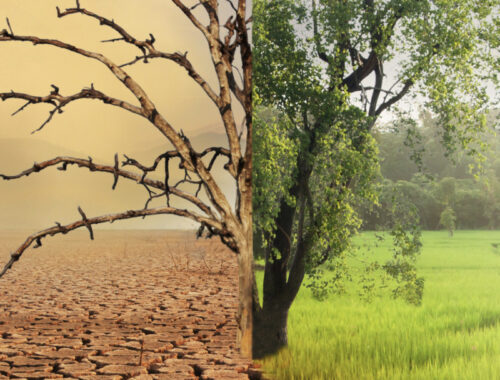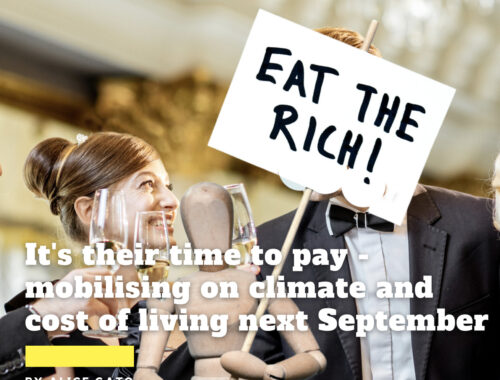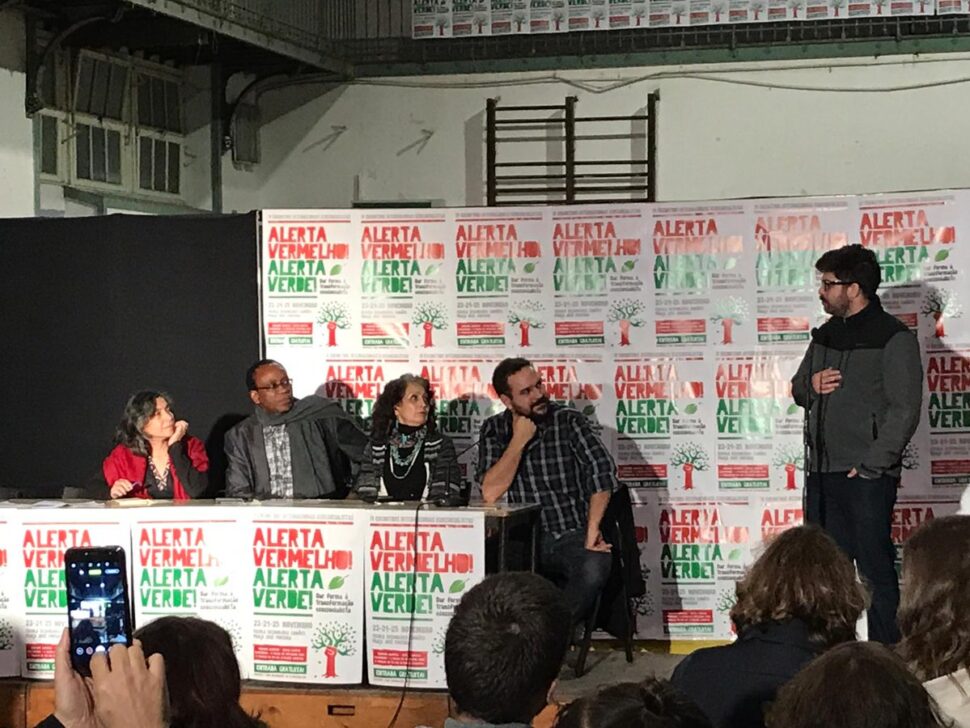
Brief history of the International Ecosocialist Encounters
BY JUAN TORTOSA
In January 2014, the 1st Ecosocialist Encounters were born at the initiative of the Group écosocialiste of solidaritéS, a movement of the Swiss anti-capitalist left (solidaritéS). It gathered a multitude of experiences, alternatives and projects that were happening a bit everywhere in Europe and in other continents, on the one hand, and on the other hand, it addressed a multiple need: to stop for a moment in activism, to take the time to reflect and share experiences. It was essential to have a meeting space to get to know each other, to share each other’s work, it was necessary to articulate our efforts, to create confluences, to propose alternatives. It was important to go beyond sectoral struggles and it was essential to have an overall vision which would allow us to articulate a project of eco-social emancipation, beyond the electoral appointments and the urgencies of the political agenda.
In these first meetings, that took place in the Swiss city of Geneva, we tackled issues such as agriculture (among others the campaign for food sovereignty in Switzerland and the conditions of workers in the Andalusian countryside from Via Campesina Switzerland and Andalusia), climate change and the need to build a movement for Climate Justice, urbanism, health and democratic planning and self-management (with representatives of the French Left Party and from Alternatibas Libertarias), the ecological consequences of a criminal austerity policy in Greece (with a Green MP), climate migration, climate change and health, and culture in times of transition. The energy transition and the challenges for trade unions in the face of the socio-ecological changes were also discussed. Another driving idea of these 1st Encounters was to get out of the European ethno-centrism and see what can be learned from the Global South, introducing eco-feminism, a concept and practice that wasn’t popularly discussed north of the Pyrenees. We were pioneers in this theme, in the French-speaking world, which today has a special relevance.
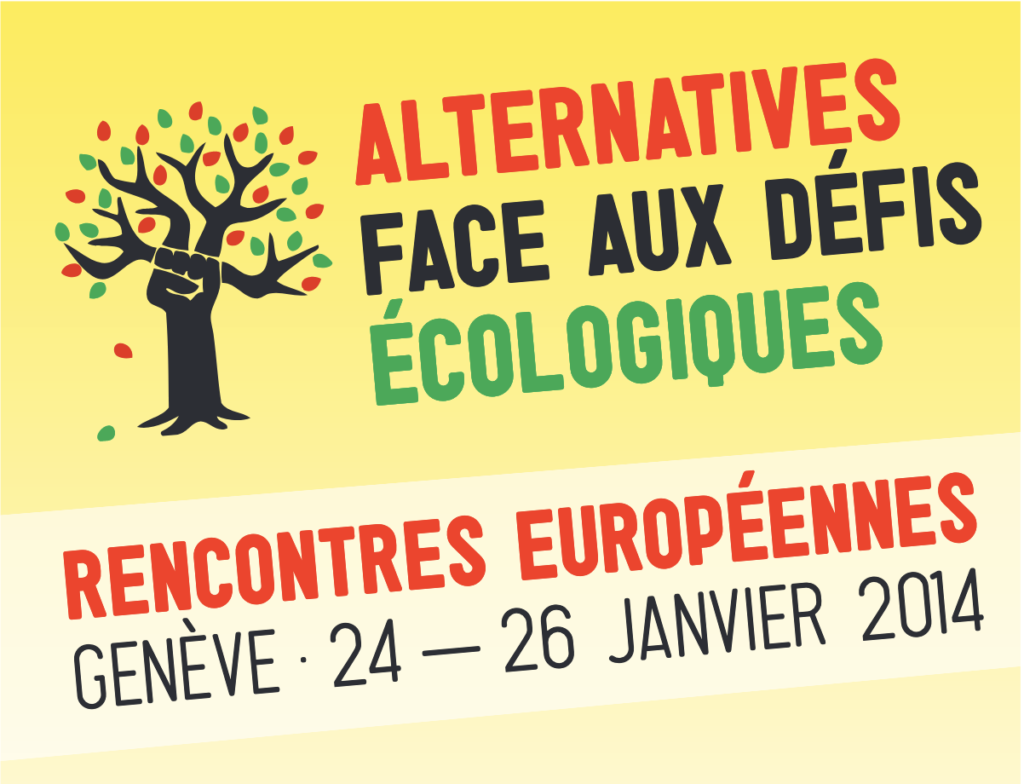
These first meetings were a success in terms of attendance, conviviality and putting into practice a common work. More than 200 people from Heuskal Herria, Spain, Catalonia, Galicia, Portugal, England, Germany, Belgium, Holland, France, Italy, Greece, Austria, Norway and of course Switzerland attended. The first meetings were a space of convergence of the diverse collectives, social movements, trade unions and politicians who thought and think that it is not possible to respond to the serious crises that capitalism is leading us into without radically breaking with it and building alternatives in which all the diversity and wealth born from the grassroots in all corners of the planet can fit. Yes, there are solutions, and it is we, the people from below, who have to build them. That was the message of the 1st Ecosocialist Encounters.
The meetings took place in the context of the ebb of the climate movement after the Copenhagen COP and a return to the local work of these movements for Climate Justice. The evidence and experience of the limits of the policy of participation within the COPs and the need to build strong movements at the edge of the COP agendas, but with an eye on the COP21 in Paris. At the end of this first space of confluence, we met for the second one in Madrid.
The 2nd Encounters were organised in Madrid at the end of June 2015, at the initiative of Ecologistas en Accion, Fundacion Viento Sur, Anticapitalistas and other collectives. The objective of these second meetings was to deepen the themes worked on in Geneva and to open new thematic gaps, such as the ecological consequences of international free trade deals such as the TTIP Trade Agreement, legislation and paradigm shift and creating a bigger focus on climate change in view of the preparation of the COP21 in Paris. We had representatives of the International and French Coordination who would coordinate the big mobilisations in December in Paris for the COP21. We broadened the themes and went into sectors that we had not been able to reach in the 1st Encounters. We had various activists from different social and environmental movements, denouncing the civil and military use of nuclear energy, the energy model based on fossil fuels, the creation of the CO2 market, land grabbing, the introduction of GMOs, extractivism, geo-engineering and false technological solutions, large socially useless projects imposed on peoples and the increasing power of multinationals that have worsened the situation of humanity and the biosphere. On a less positive note, we had less participation from the rest of Europe, although we did have the presence of a parliamentarian from the greater Buenos Aires in Argentina. Our second Encounters were held in difficult conditions, after a year of intense political activity in the Spanish State and with a great tiredness of the militancy, but we managed to create a bridge between what was being done in the Spanish State and the rest of Europe, while at the same time strengthening the links with Heuskal Herria, which took up the baton. There were about 150 participants.

As a result of this, the 3rd Encounters were organised in Heuskal Herria, the Basque Country, in September 2016. These meetings were the confluence of environmentalists, trade unionists (ELA, LAB), Alternatiba (Bayonne), nationalist parties of the left, eco-feminists and anti-capitalists of the Spanish state and some international organisations such as solidaritéS. More than 350 people participated. The central theme was the role of trade unions in the energy transition and the concrete proposals for Euskadi. There were also a lot of debates on food and energy sovereignty and the role of education in a transformative project. The meeting was organised by collectives and associations that are deeply rooted in the society of Heuskal Herria and this was reflected in the debates. Some organisations from North Africa also participated.
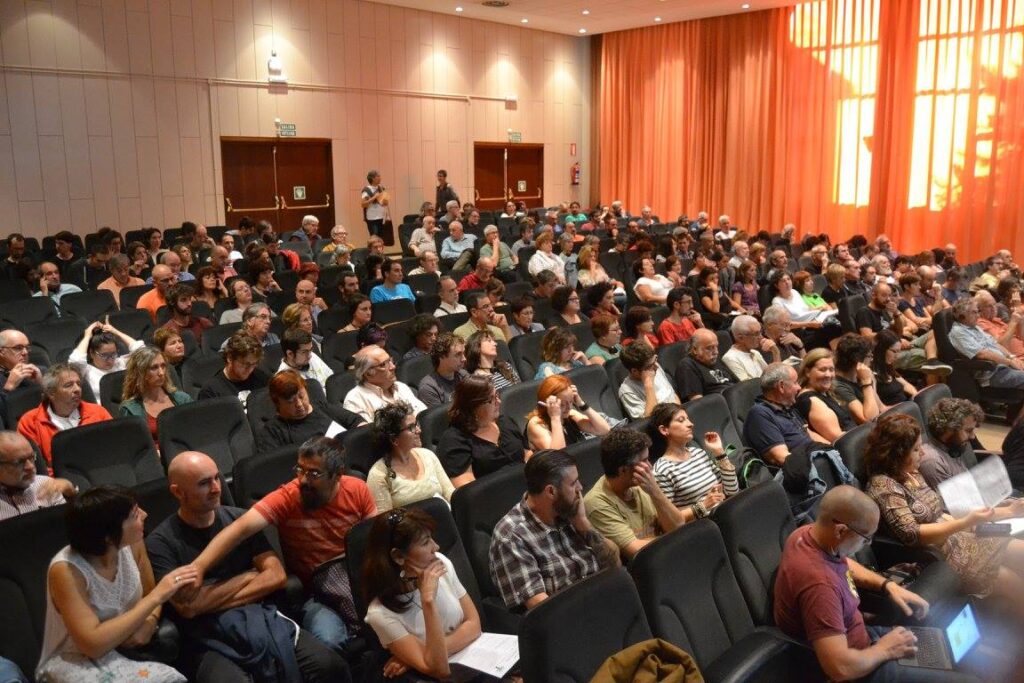
The 4th Encounters, under the title “Red Alert, Green Alert: shaping the ecosocialist transformation” were held in Lisbon from 23rd to 25th November 2018. They were the result of the cooperation of a large number of local groups and an international coordination. These meetings meant a step forward in the number of participants, with more than 450 participants. An international call signed by many individual activists as well as local and international collectives was the launching platform. The previous organisers were involve in the drafting of the Call and the themes. There were several international meetings online preceding the event and a solid attempt to integrate participants as organisers as well. In these 4th Encounters many more activists from the Global South participated: from Bolivia, from Brazil, Nigeria, the Philippines, South Africa as well as activists from Standing Rock, in the USA.
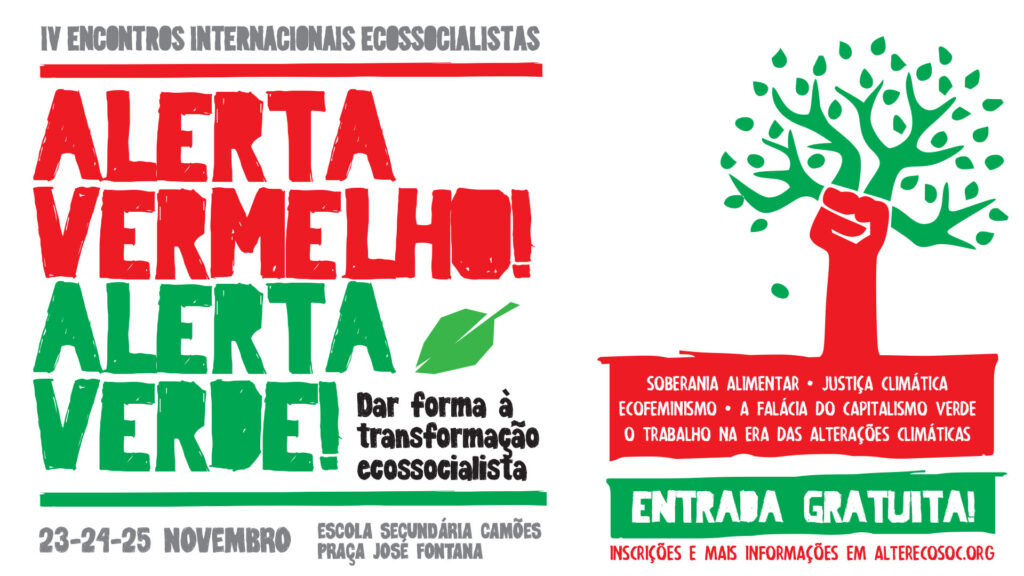
The themes were centred on the alternatives to climate collapse, with a big focus on Just Transition, with a Climate Jobs and Just Transition Gathering (with participants from climate jobs campaign around the world), and four main axis: the political economy of food sovereignty, dismantling green capitalism’s fallacies, climate justice and energy democracy and ecofeminism. It was a success of participation, the biggest meetings held so far.
In January 2022, the 5th International Ecosocialist Encounters were organised, once again in Lisbon. After the long hiatus because of COVID-19, these Encounters were promoted by climate justice collective Climáximo and 70 organisations and networks from every continent. Hard travel restrictions limited physical participation from activists from outside Europe. The encounters organised around three big questions:
1) How? Where does power reside today and how can it be dismantled, how to create disruption and use opportunities?
2) Who? Who are the revolutionary subjects of ecosocialism? Who’s already mobilized, who is ready to be mobilised, who isn’t but should be?
3) Where to? What key values will guide a new society that we envision? What social and economic organisation will it have?
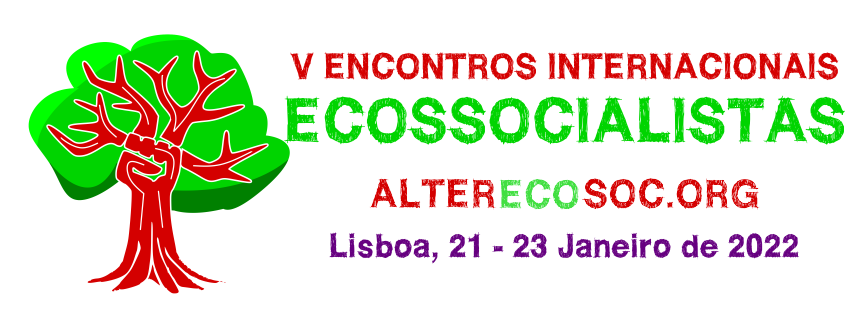
The preparation for the Encounters started in August of 2021 and in January was launched to coincide with two other international conferences to take place in Lisbon: the Glasgow Agreement global conference, and the training and conference of Global Climate Jobs. The three events, that happened from the 14th to the 23rd of January, were designed to feed each other, to allow for longer periods of real-life collaboration of activists and to reduce logistical burden. The 5th International Ecosocialist Encounters were intended to answer to the growing necessity to seriously talk about ecosocialism, strengthen the ecosocialist movement, and finding the tools and strategies to achieve ecosocialism.
Although the event had around 200 participants physically present (from dozens of countries around the world – Peru, Colombia, Brazil, Costa Rica, Pakistan, USA, Morocco, Canada, Turkey, UK, Spain, France, Ireland, Netherlands, Germany, Austria, Switzerland, France, among others), webinars were held in preparation and a component was created to be led from the Global South, with a series of events happening online during the encounters.
From these encounters, there were three key outcomes:
– The launch of The Great Climate Justice Caravan, organized by the Glasgow Agreement;
– The 2022 Lisbon Declaration on Climate Jobs and Just Transition, by the Global Climate Jobs Campaign,
– The launch of a new international magazine Fight the Fire – The Ecosocialist Magazine (with responsibilities in the organisation of the next international ecosocialist encounters).
Functioning of the Ecosocialist Encounters
The first meetings were an initiative of the Groupe Ecosocialiste de solidaritéS (Switzerland). The elaboration of the manifesto was done in collaboration with some international ecosocialist activists (such as Michael Löwy, Manuel Gari, Yayo Herrero, Christophe Aguiton). The elaboration of the Manifesto calling for the 1st Encounters was a collective work, signed by militants who called to come to Geneva. There was a lot of collaboration between the Geneva organising group and some international activists, mainly with people from Spain and France, in order to elaborate the programme and as far as possible to receive contributions from the participants before the meetings. Each collective contacted could propose workshops. There were more than 200 participants from more than thirty organisations. At the end of the 1st Encounters, militants of the Spanish State proposed to organise the 2nd Meetings and it was accepted in the final plenary.
For the 2nd Encounters, which were organised on a similar formula to the 1st Encounters, there was a manifesto of militants calling for participation. This manifesto was worked out jointly, between the organisers of the Spanish State and those of the 1st Meetings (Groupe écosocialiste de solidaritéS). They took place in a particular political context in the Spanish State. The participation was smaller and more restricted at the international level, even if there were some representations from Latin America.
The themes addressed in the first ones were deepened and new themes were learnt. It was organised mainly by the Foro Viento Sur, Anticapitalistas y Ecologistas en Accion and the Groupe écosocialiste de solidaritéS. At the end of the Meetings, the comrades of the Basque Country proposed to organise the 3rd Meetings.
In the 3rd Encounters, as in the previous ones, a call was created between the various organisations that had organised the previous Meetings and the hosts. There were several physical meetings in the Basque Country between the organisers of the 1st and 2nd meetings and those who were organising the III Encounters. More than 300 people participated in the meetings. There were four main axes:
1) Productive model, employment and care model.
2) Food sovereignty,
3) Energy sovereignty and
4) The challenges of the trade union world in the face of eco-social transitions.
In the 4th Encounters, held in Lisbon, there was a similar manifesto / call signed by activists and supporting organisations – Climáximo and the Left Bloc were the main drivers of the event. An international coordination with previous organisers was maintained, which led to preparatory meetings for the proposals of workshops and themes, open to new continents. The meetings had a very open organisation, with dozens of volunteers from organisations and the general public contributing to the preparation and the functioning of the encounters. The event articulated with Rosa Luxemburg Foundation to coincide with the organisation of the Lisbon Just Transition gathering, which allowed for the participation of many more people from around the world, creating an axis on “Labour in the age of climate change”. The space for networking was strongly promoted, and important proposals came from it, namely in terms of Iberian and international climate justice coordination.
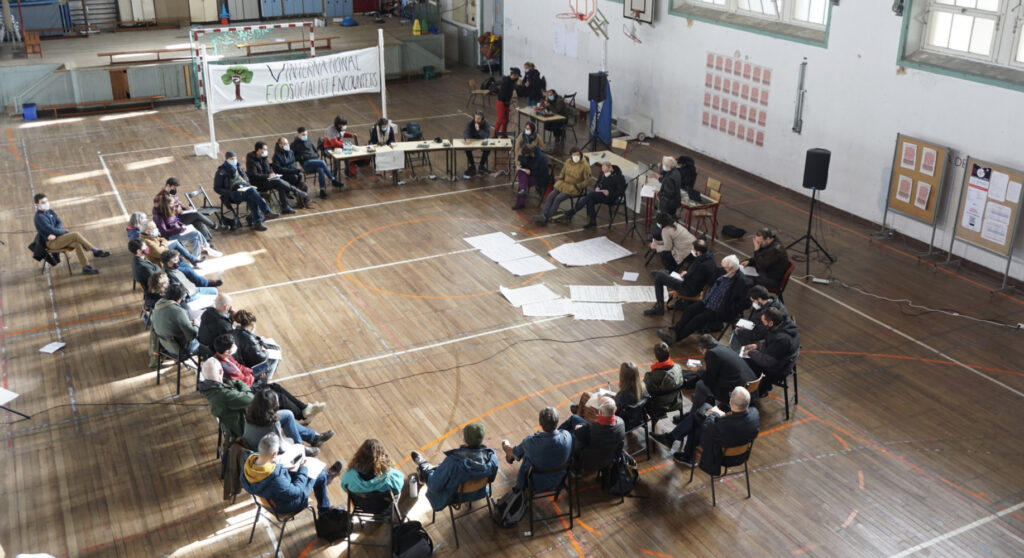
The 5th meetings in Lisbon were already organised in the post-COVID19 world, where online methods had seriously evolved. They were also the first meetings after the 2019 Extinction Rebellion and Youth Climate Strikes had happened. There was a big focus on the climate justice movement as a key actor for the ecosocialist idea. It was also planned to coincide with the organisation of a climate jobs international training and conference (supported by Transform! Europe) and with the Global Conference of the Glasgow Agreement (a global platform for climate justice grassroots movements), to reinforce and put these initiatives in contact with each other. A broad international coalition was responsible for the preparation of the events, and there was a shift from looser sessions into sessions more focused on how to proceed with ecosocialist transformation, namely trying to respond to the three big issues of How?, Who? and Where To?. This magazine was also one of the outcomes of these meetings, and we have assumed the responsibility of helping set up subsequent editions of the Ecosocialist Encounters.
Methodology and practical aspects of the Encounters
– The signatories commit themselves to be present at the Encounters and, as far as possible, to participate in the preliminary debates.
– A provisional programme is proposed. Proposals for changes of themes or workshops topics can be made.
– Preparatory work is highly valued with contributions are open to all organisations and speakers.
-The organising group makes formal proposals for the organisation of the workshops on the basis of the contributions received.
– The three official languages of the Meetings are English, French, Spanish and the language of the organising country. We provide as much as possible translation into these languages.
– The Encounters are a working space for different social and political sectors at international level who believe that the only way to respond to the current ecological and social emergency is a radical break with capitalism.
– The outcomes of these meetings can be measured by several indicators: documents/manifestos that define our profile and intention of work and that allows other people to come closer to it; agreements on the theses of the organisation; creation of international
information network; further international initiatives; broadening the networks; concrete proposals that can be launched in social, trade union, ecosocialist or ecological organisations.
The aim has always been to make the Encounters a stepping stone for the creation of a critical anti-capitalist space that provides references in the international social and political left and the climate justice movement.
The identity card of the Encounters
The Encounters have brought together over the years collectives and organisations that think that the current social and climatic crises cannot be solved within the framework of the capitalist system and that a break with this system is necessary. Climate Justice, ecological, feminist, anti-colonial, anti-racist and social struggles are interrelated. There is a broad coalition of ecosocialism, social or libertarian ecology, ecofeminism, class syndicalism, anti-capitalist degrowth, and libertarian currents. Each organising collective has the autonomy to decide with whom it organises, within this open anti-capitalist framework in the broad sense.
Within the Encounters there can be related currents of social or political movements (there were meetings of people who are members of the CJA, from By2020 We Rise Up, from 2020 Rebellion por el Clima, from the Glasgow Agreement, from Global Climate Jobs, from Gastivists, among many others). Any proposal for new Encounters should come to the main organisations that have organised the previous ones. As we all know who has organised each Encounters, a previous information to these collectives before launching the next helps maintain cohesion and confidence.
The Call for Encounters has always been made in a participatory way between those who are going to organise the Encounters and those who have organised the previous ones.
There is an informal coordination of the Ecosocialist Encounters made up of the main organisers of each meetings. This coordination is growingly more stable and should be growingly clear, diversified and politically focused on creating debates that lead into concrete action and concrete organisation.

Juan Tortosa is an ecosocialist activist and organizer based in Geneva, Switzerland. He has founded the International Ecosocialist Encounters and the Groupe Écosocialiste of the Swiss party Solidarités. He is active in different climate justice collectives and against the role of the Swiss financial centre in the climate crisis. He is president of the CCJSS – Coordination Climate, Justice Social et Solidarité and is a founding member of the Breakfree Suisse collective (civil disobedience collective) . He is currently the Swiss spokesperson for the Committee for the Abolition of Illegitimate Debt.




